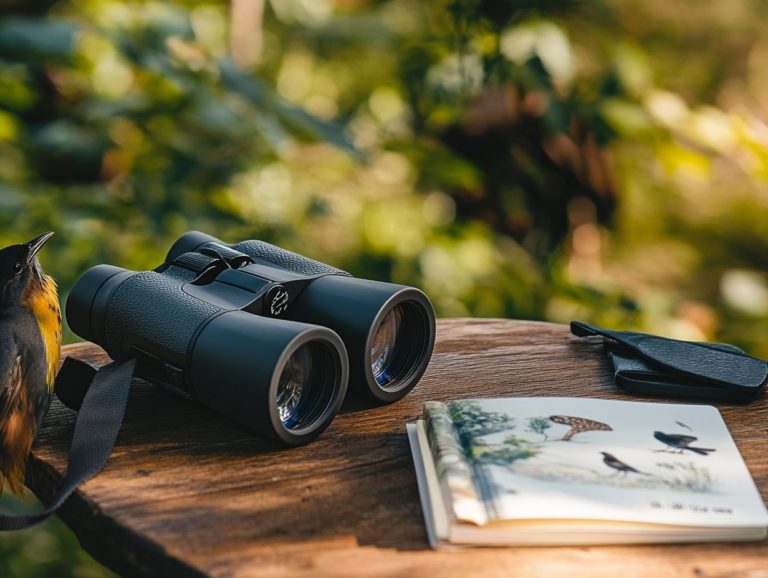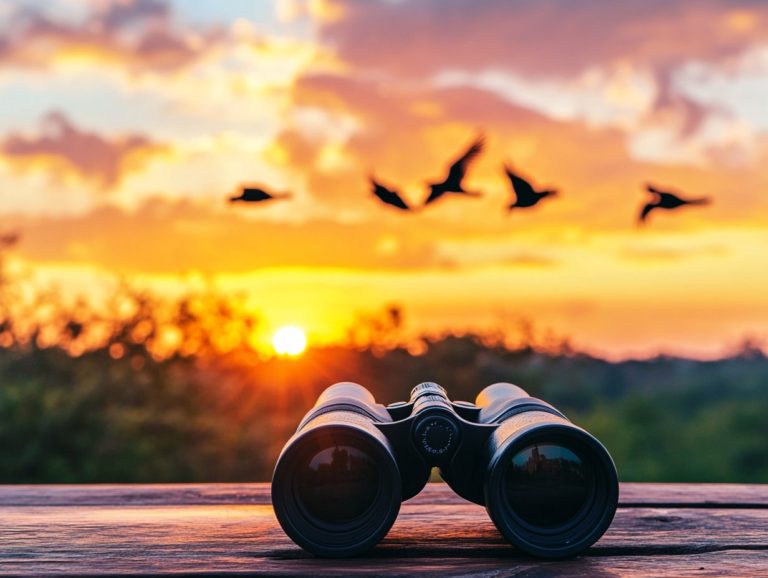How to Clean and Care for Your Binoculars
Binoculars are indispensable tools for birdwatching, nature observation, and sporting events, elevating your ability to see distant objects with remarkable clarity.
Like any cherished piece of equipment, they deserve proper care and maintenance to ensure they remain in peak condition and deliver optimal performance.
This guide delves into the significance of cleaning and caring for your binoculars, highlighting the advantages of regular maintenance and the essential tools you ll need.
By following the step-by-step instructions for cleaning your binoculars, you will uncover best practices for safe storage and transportation.
Keep your binoculars in excellent shape, and relish clear, vibrant views for years to come!
Contents
- Key Takeaways:
- Why Cleaning and Caring for Binoculars is Important
- Tools and Supplies for Cleaning Binoculars
- Step-by-Step Guide to Cleaning Binoculars
- Storage and Transportation of Binoculars
- Frequently Asked Questions
- Wondering if you can use any cleaner on your binoculars?
- What is the best way to remove dirt and debris from my binoculars?
- How often should I clean my binoculars?
- Can I use water to clean my binoculars?
- Definitely store your binoculars in a case to keep them safe!
- What should I do if my binoculars get wet?
- Quick Checklist for Binocular Care:
Key Takeaways:
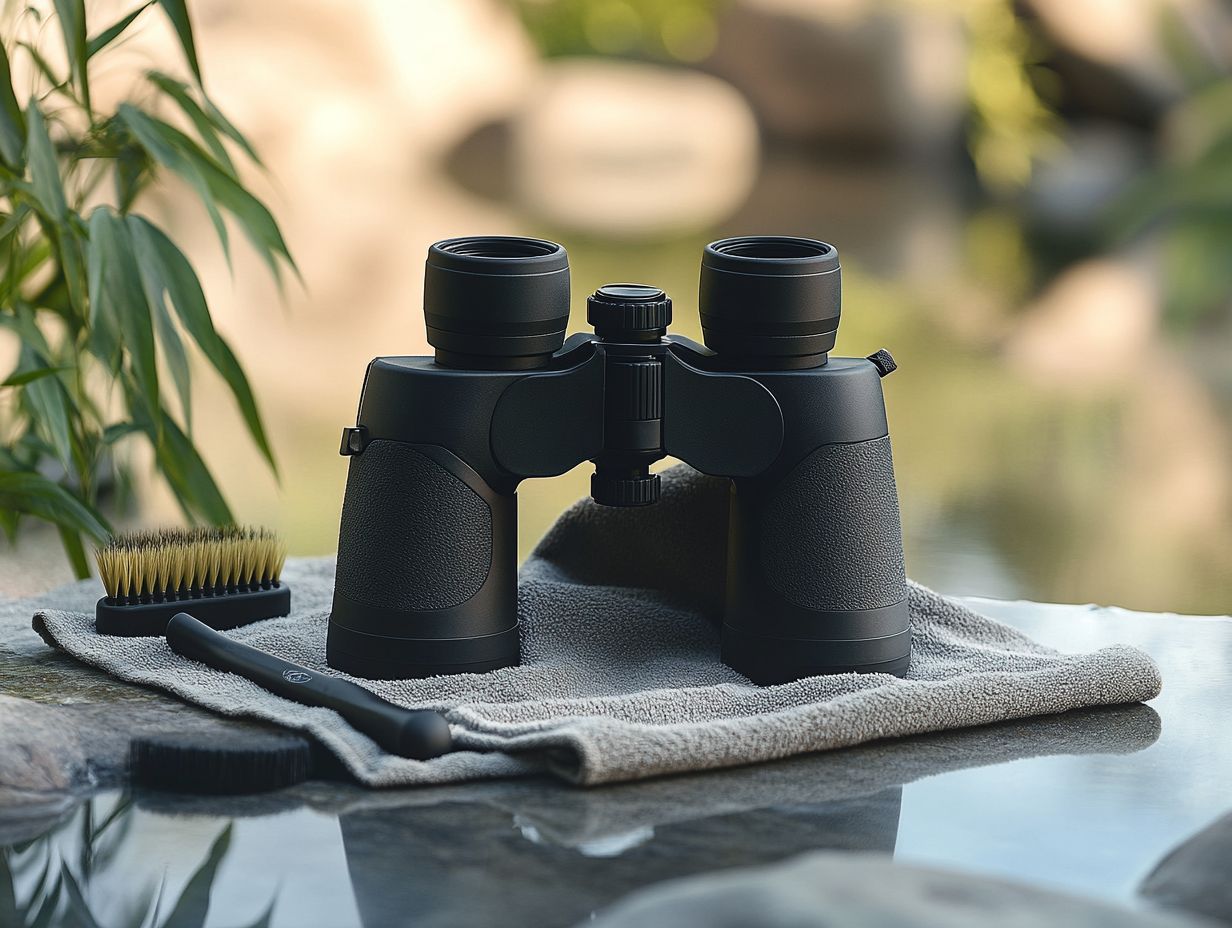
- Regular cleaning and maintenance of binoculars is crucial for optimal performance and longevity.
- Proper tools and techniques, like using a lens brush and microfiber cloth, are essential for safe and effective cleaning.
- Store binoculars in a protective case and avoid extreme temperatures to help prevent damage and prolong their lifespan.
What are Binoculars and How Do They Work?
Binoculars are your gateway to magnifying distant wonders, essential for outdoor enthusiasts engaged in activities like stargazing and birdwatching. These remarkable devices comprise two telescopes positioned side by side, employing a sophisticated arrangement of lenses and prisms to optimize light transmission and craft a vivid, three-dimensional image.
To truly appreciate how binoculars function, you ll want to delve into their critical components lenses, eyepieces, and how the lenses line up all of which play a vital role in shaping your viewing experience.
Take, for example, the lenses: their quality is paramount in determining the clarity and brightness of the image you see. Coatings on the lens surfaces work tirelessly to minimize glare and enhance light transmission, elevating your observations.
Renowned manufacturers like Swarovski, Nikon, and Canon have pioneered cutting-edge optical technologies that cater to a diverse range of users, from casual birdwatchers to experienced astronomers. These brands are committed to innovation in optical design, ensuring that every pair of binoculars adheres to rigorous performance standards.
With features like waterproofing, ergonomic design, and adjustable eyecups, these binoculars promise not only functionality but also user comfort, transforming every outdoor adventure into a pleasurable experience.
Why Cleaning and Caring for Binoculars is Important
Cleaning and caring for your binoculars is crucial for preserving their performance, allowing you to revel in clear and unobstructed views during outdoor activities like stargazing and birdwatching. For detailed insights on how to maintain your bird watching binoculars, committing to proper maintenance not only extends the lifespan of these valuable tools but also enhances the quality of light transmission through the lenses.
Keep your lenses spotless to enjoy breathtaking views every time you venture outdoors! Keeping the optical surfaces free from dust, dirt, and moisture ensures that your image quality remains pristine, elevating every moment you spend in the great outdoors.
Benefits of Proper Maintenance
Proper maintenance of your binoculars brings a wealth of benefits, including enhanced lens performance, improved optical clarity, and a longer lifespan for your equipment. This is especially crucial for outdoor enthusiasts like you, who rely on these tools for activities such as birdwatching and stargazing.
Establishing a regular cleaning routine can keep your binoculars free from debris and smudges that might obstruct your view and diminish your overall experience. For more detailed guidance, check out how to maintain your bird watching equipment. Routine cleaning with the right tools, like microfiber cloths and specialized lens cleaners, greatly enhances your maintenance efforts.
It’s essential to avoid common pitfalls, such as using abrasive materials or excess moisture; these mistakes can scratch the lenses or create fogging issues, severely affecting usability.
Regularly checking for alignment and making focus adjustments can help prevent minor issues from escalating into larger problems. By taking these steps, you can ensure your binoculars perform at their peak, delivering crystal-clear views that elevate your adventures in nature.
Start your binocular maintenance routine today and unlock a world of clear, vibrant views!
Tools and Supplies for Cleaning Binoculars
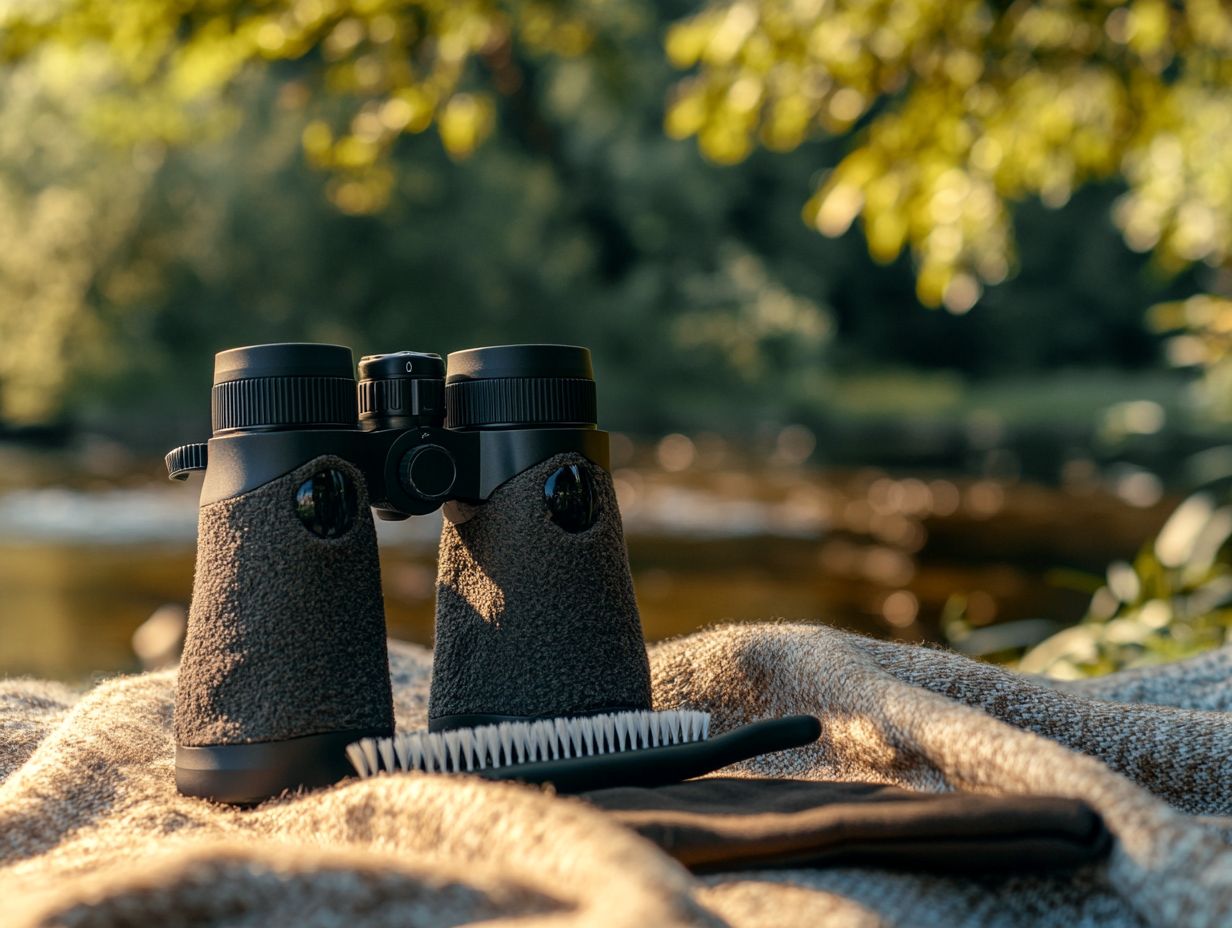
Equipping yourself with the right tools for cleaning binoculars is crucial for preserving their performance and optical integrity. This is especially important during outdoor activities like stargazing and birdwatching.
Essential items in your kit should include:
- High-quality microfiber cloths
- Specialized lens pens
- Puffer brushes
- Cleaning solutions that eliminate dust, dirt, and smudges without harming the delicate coatings on the lenses
Essential Items for Cleaning and Maintenance
To clean and maintain your binoculars, you need microfiber cloths and specialized cleaning solutions. Protective lens caps are also essential to shield the optical surfaces from dust and moisture.
These tools work together to keep your binoculars in prime condition. You ll enjoy every moment of your outdoor adventures, whether you re birding or stargazing.
A soft brush is essential for gently removing larger debris or particles. Invest in a lens brush designed specifically for lenses; it won t trap dust or oils, keeping your equipment spotless.
For stubborn smudges, try a specialized cleaning solution on your microfiber cloth. This restores clarity without causing harm. Store your binoculars in a padded case to protect them from bumps and to minimize exposure to environmental elements.
By integrating these essential tools into your maintenance routine, you can significantly enhance both the longevity and performance of your binoculars. Ensure they are always ready for your next great adventure!
Step-by-Step Guide to Cleaning Binoculars
Follow precise techniques to clean your binoculars. This ensures that the lenses and optical surfaces remain pristine, free from dust, dirt, and moisture. Additionally, consider tips for storing your bird watching binoculars to maintain optimal performance, which is essential for activities such as stargazing and birdwatching.
This guide outlines a comprehensive routine that addresses both the exterior and interior components, including eyepieces and lens caps. You ll achieve thorough cleaning while minimizing any risk of damage.
Proper Techniques and Tips
Using proper cleaning techniques is essential for preserving the functionality and longevity of your binoculars, especially in outdoor settings where they are vulnerable to moisture, dust, and dirt. For those with spotting scopes, following guidelines on spotting scope care can be equally important to protect your investment.
Incorporate effective lens cleaning methods and maintenance guidelines to avoid potential damage. This ensures your optical surfaces remain clear for birdwatching and stargazing.
Using lens pens to gently remove smudges and microfiber cloths for polishing will enhance lens clarity. Regular inspection is equally important; check for dirt accumulation and clean as needed.
For optimal care, avoid exposing your binoculars to extreme temperatures. Store them in a protective case when not in use. A simple blow or soft brush can eliminate loose dust, preventing scratches and helping maintain pristine optical performance.
Storage and Transportation of Binoculars
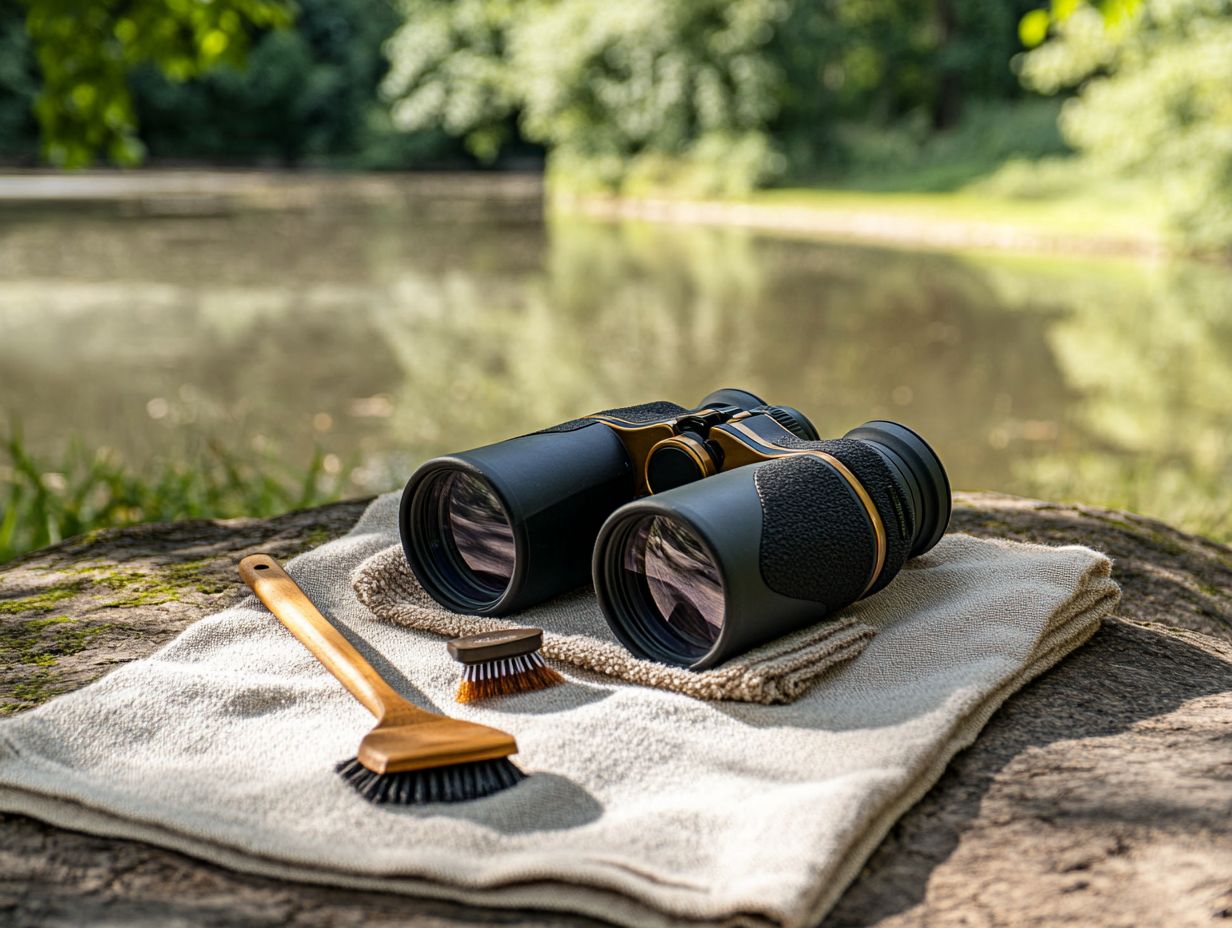
The proper storage and transportation of binoculars are vital for preserving their integrity, especially in unpredictable outdoor environments where moisture and humidity threaten the optical surfaces.
Use protective cases and lens caps to safeguard these valuable investments. This ensures they remain in optimal condition for your stargazing and birdwatching pursuits.
Best Practices for Protecting Your Binoculars
Implementing best practices for protecting your binoculars is essential to keep your equipment functional and clear for activities like birdwatching and stargazing. This includes using protective cases, securely attaching lens caps, and avoiding moisture and extreme humidity.
Opting for a hard-shell case can significantly elevate the protection during transport. It safeguards those delicate lenses from impacts and temperature swings.
When storing your binoculars, choose a cool, dry place away from direct sunlight. Prolonged exposure can degrade materials over time.
Regular cleaning is crucial for maintaining clarity and performance. Use a microfiber cloth to prevent dust buildup that could cloud your vision. By engaging in these preventive measures, you not only extend the lifespan of your binoculars but also optimize their performance, ensuring every outdoor adventure is met with crisp, clear images.
Frequently Asked Questions
Wondering if you can use any cleaner on your binoculars?
No, it’s important to use a cleaner specifically designed for optics. Harsh chemicals or household cleaners can damage the lenses or coating on your binoculars.
What is the best way to remove dirt and debris from my binoculars?
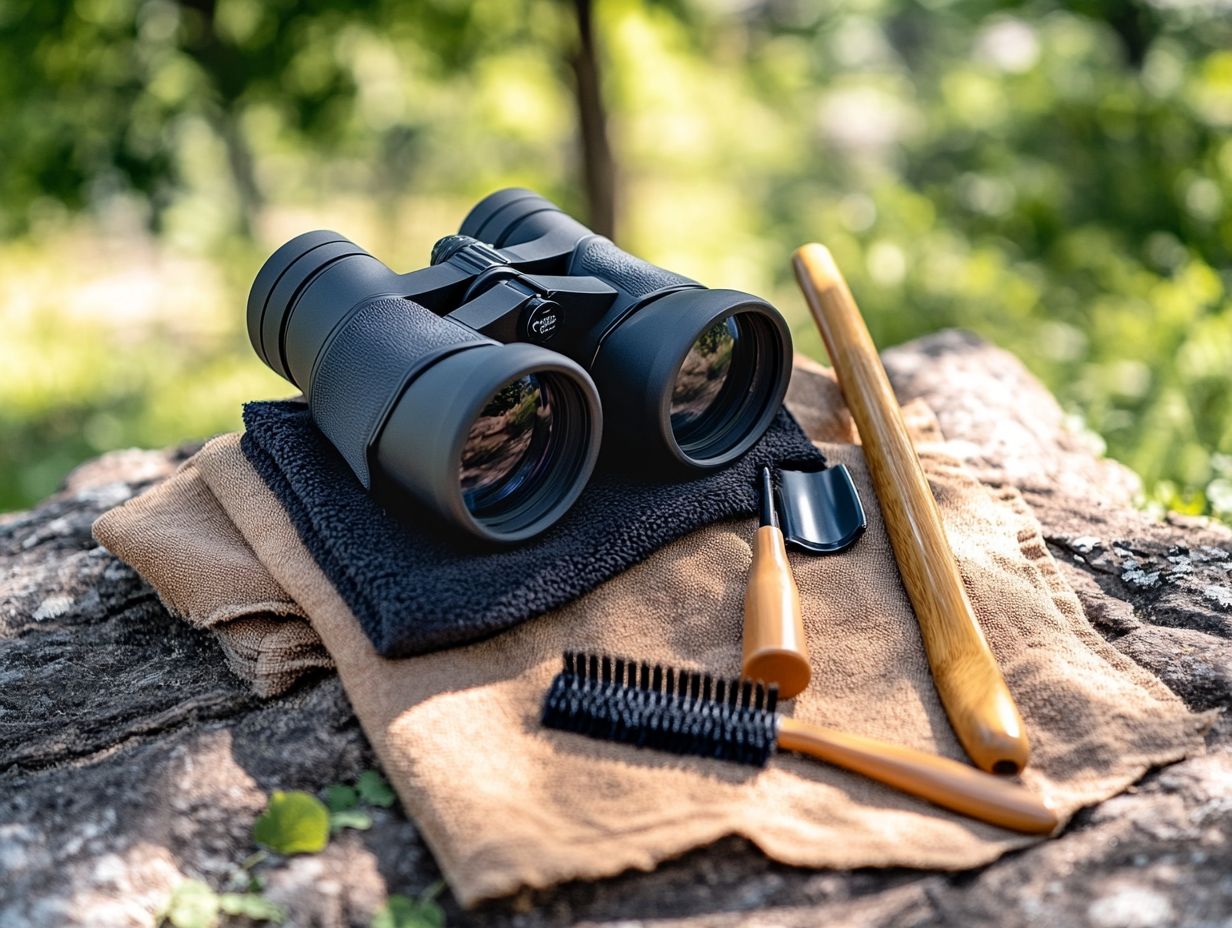
Use a soft-bristled brush or a lens cleaning pen to gently remove any dirt or debris from the lenses. Avoid using your fingers or a rough cloth, as they can scratch the lenses.
How often should I clean my binoculars?
It’s recommended to clean your binoculars after every use, especially if they were exposed to dust, dirt, or water. This practice will help maintain their optimal performance and protect them from damage.
Can I use water to clean my binoculars?
Yes, you can use water to clean your binoculars, but make sure to use distilled water or tap water that has been boiled and cooled. Avoid using salt or mineral water, as they can leave deposits on the lenses.
Definitely store your binoculars in a case to keep them safe!
Yes, storing your binoculars in a case when not in use will help protect them from dust, scratches, and other potential damage. Make sure the case is clean and dry before storing your binoculars.
What should I do if my binoculars get wet?
If your binoculars get wet, use a clean, dry cloth to gently wipe away the water. Then, let them air dry completely before using them again. Avoid using heat or direct sunlight to dry them, as it can damage the lenses.
Quick Checklist for Binocular Care:
- Use a hard-shell case for transport.
- Store in a cool, dry place away from sunlight.
- Regularly clean with a microfiber cloth.
- Keep lens caps securely attached.
- Wipe off moisture immediately if binoculars get wet.


